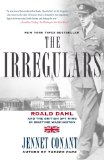Summary | Excerpt | Reviews | Beyond the Book | Readalikes | Genres & Themes | Author Bio

Roald Dahl and the British Spy Ring in Wartime Washington
by Jennet Conant
Dahl was a patriot and intensely loyal to the RAF, almost to a fault. He was all for helping the British and American air accord but could not help sounding off about the various hypocrisies of their dueling propaganda agencies, which, in his view, were more often than not in discord. It irked him, for example, that whenever an RAF raid took place within the same twenty-four hour period as a U.S. Army Air Force, strike, the British Information Service (BIS) would end up in direct competition with their American equivalent, the Office of War Information (OWI), to see which agency could get the most publicity for its respective force. Obviously, the British, who were new to the country and did not understand the complex workings of the American press system, were at a disadvantage. Similarly, he had heard that the OWI experts working in the American Embassy in London were having difficulty disseminating U.S. propaganda there and were getting little or no help from their British counterparts. Considering that they were all supposed to be pulling together, this was a situation that struck Dahl as anything but collegial, and he leaped forward to remedy the situation. When he raised this sore point in official forums, along with his suggestions as to how the situation might be improved, he managed to ruffle feathers on the both sides of the pond.
As it happened, neither country was particularly pleased to have a vocal critic of its vying propaganda efforts. Dahl knew his impertinence was not endearing him to embassy officials, but he did not much care. He could not curb his tongue when pilots were still dying in droves as a result of the Luftwaffe's renewed bombing campaign. Not that everyone found fault with his impolitic outbursts on behalf of the ordinary British fighting man. Dahl's unsparing assessment of the RAF's failures, with which he was intimately acquainted, and his frank observations about the shortcomings of their air strategy in general often got a warm reception in Washington, where many Americans had grown weary of the history-and-heroes routine of the relentless pro-British interventionists.
Dahl stood out from the other young British envoys who, for the most part, were fawning aides from the privileged class who had been dumped on the embassy's doorstep to keep them out of harm's way. From a physical standpoint, he was pure Norwegian, with the arrogant blue eyes and imposing stature of his Viking ancestors, though he liked to boast that he was one-quarter Scottish, as his mother was descended from an illegitimate son of Sir William Wallace. He had a fine head, a high forehead, and a crown of wavy brown hair neatly parted and combed over to the right. Among his colleagues, he proudly identified himself as Norwegian rather than British, and most of his cultural references, from childhood fairy tales to favorite home-cooked meals, were rooted in his Nordic heritage. He spoke his native language fluently, as English was rarely spoken at home and as he had spent all his summer holidays from the age of four to seventeen on the islands off the coast of Oslo, where he was taught to be an intrepid sailor and adventurer in the tradition of his fearless forebears. Having survived the barbaric traditions of English boarding schools for ten years, Dahl was a part of the old-boy network without quite belonging to it; he knew its rules and rituals intimately and could partake in the hearty camaraderie while barely disguising his contempt. Despite being a fair student and star athlete -- he had excelled at soccer, squash, racquets, and a fast-paced variation of handball known as "fives" -- he had never quite fit in. He was always viewed by his schoolmasters with suspicion and regarded as "unpredictable" and someone "not to be trusted." He had a rebellious streak, and it was this iconoclasm that appealed to Americans. They thought they recognized in Dahl a kindred spirit, with his outrageous candor and irreverence for authority, so that those who were wary of British nobility playing at war adopted him as one of their own.
Copyright © 2008 by Jennet Conant




There are two kinds of light - the glow that illuminates, and the glare that obscures.
Click Here to find out who said this, as well as discovering other famous literary quotes!
Your guide toexceptional books
BookBrowse seeks out and recommends the best in contemporary fiction and nonfiction—books that not only engage and entertain but also deepen our understanding of ourselves and the world around us.